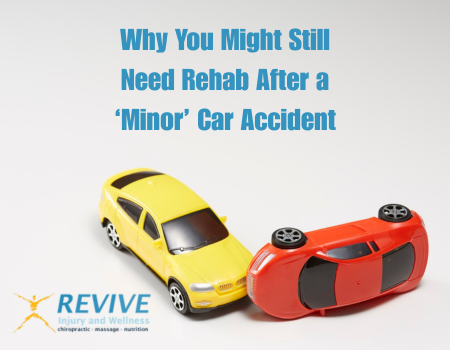
When most people think of car accidents that require rehabilitation, they often picture devastating collisions involving severe injuries and totaled vehicles. However, the reality is that even so-called “minor” car accidents — those with little visible damage and no immediate, obvious injuries — can leave lasting effects on the body. In fact, many people underestimate the impact of these accidents, only to find themselves dealing with lingering pain, stiffness, and mobility issues days or weeks later.
If you’ve recently been in a minor car crash and are wondering whether rehabilitation is really necessary, here’s why it might be one of the most important steps you can take for your long-term health and recovery.
Minor Car Accidents Can Cause Major Injuries
Even at low speeds, the force involved in a vehicle collision can jolt the body in unnatural ways. Your muscles, ligaments, joints, and spine absorb much of the impact, which can result in soft tissue injuries, sprains, strains, and whiplash — all of which may not present symptoms right away.
Whiplash is especially common in rear-end accidents, even those that occur at speeds as low as 5-10 mph. The sudden back-and-forth motion of the head and neck can overstretch muscles and damage soft tissues. Without proper treatment, this can lead to chronic neck pain, headaches, limited range of motion, and nerve issues.
Other injuries that might develop after a minor crash include:
- Lower back pain
- Shoulder and knee injuries from bracing or impact
- Muscle stiffness and spasms
- Concussions and mild traumatic brain injuries
- Temporomandibular joint (TMJ) pain from jaw clenching during impact
Because these injuries often don’t involve broken bones or visible wounds, they can be overlooked — which is where rehab becomes crucial.
Why Early Rehab Matters
One of the biggest mistakes people make after a minor accident is assuming they’re fine because they aren’t in immediate pain. In truth, symptoms from soft tissue injuries and concussions can take hours, days, or even weeks to fully appear. By the time discomfort sets in, underlying injuries may have worsened due to inflammation or restricted mobility.
Rehabilitation helps address these problems early, often preventing minor injuries from turning into long-term issues. A rehab program may include physical therapy, chiropractic care, massage therapy, or other treatments tailored to your specific needs.
The goals of rehab after a minor car accident typically include:
- Reducing pain and inflammation
- Restoring flexibility and range of motion
- Strengthening muscles to support injured areas
- Improving posture and alignment
- Preventing the development of chronic conditions like tension headaches, back pain, or joint stiffness
Protecting Your Long-Term Health
It’s easy to dismiss a sore neck or back after a fender-bender as something that will heal on its own. But untreated soft tissue injuries can lead to compensatory habits, like favoring one side of your body, poor posture, or limited movement, all of which increase the risk of future problems.
For example, if you avoid turning your neck fully because of pain or stiffness, you might develop shoulder tension or headaches as your body compensates. Similarly, limping due to knee pain can strain your hips and lower back. Rehab can help retrain your body to move properly, reducing the chances of long-term complications.
Rehab Supports Emotional Recovery Too
Beyond physical healing, rehabilitation can also play a role in emotional recovery after a car accident. Even minor crashes can trigger anxiety, sleep disturbances, and fear of driving. The physical discomfort combined with psychological stress can take a toll on your overall well-being.
Rehabilitation programs often incorporate holistic approaches to healing, including relaxation techniques, breathing exercises, and gradual reintroduction to activities like driving. Addressing both the physical and emotional effects of an accident is essential for a full recovery.
Don’t Let Insurance or the Word ‘Minor’ Deter You
Some people avoid seeking rehab after a minor crash because they’re worried about insurance coverage or they believe their injuries aren’t “serious enough” to warrant treatment. However, your health should always come first. Most insurance policies — including personal injury protection (PIP) and medical payments (MedPay) — cover rehabilitation services for accident-related injuries, regardless of fault.
Additionally, getting evaluated and starting treatment early creates a documented medical record, which can be invaluable if symptoms worsen or if you need to file a personal injury claim later on.
Even a minor car accident can disrupt your life in significant ways if injuries go unaddressed. Rehab isn’t just for severe crashes — it’s for anyone looking to recover fully, prevent future problems, and return to normal activities safely. If you’ve recently been in a fender-bender and are experiencing stiffness, soreness, or discomfort, consider seeing a medical professional and asking whether rehabilitation might be right for you. Prioritizing your recovery today could protect your health for years to come.


